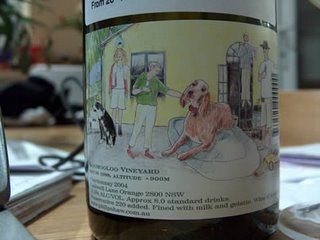
This is the view from where I'm sitting, late on a Monday evening here in west London. The price you pay for making progress as a young (that's what I like to think) wine writer is having to work when other people are playing. I guess the plus point is that for me, work is play. So it's possible to keep up a high output without sacrificing your family life, and without burning out, when you are doing something you enjoy.
Writing about wine isn't all fun, though. You have to drink (or, at least, taste) some pretty depressing wines if you are writing a national wine column that has to major on the wines that are widely available at supermarkets and high street wine outlets (not that these retailers don't have good wines - they do... as well as some bad ones). I find my wine tasting often results in runs of good or bad wines clustered together like buses. I'm on a bad run at the moment. Last night I opened a couple of rubbish wines, and tonight I opened three more before I found something half-decent to drink.
My vinous accompaniment this evening is Philip Shaw's No 11 Chardonnay, from a single, cool-climate vineyard at 900 metres elevation in Orange, New South Wales. It's an interesting
 wine: quite classy, bready, mealy and almost malty, with nice oak and a crisp cool-climate feel to it. I reckon this needs a year or two more to come into its own, when it might be quite special indeed. You wouldn't mistake it for white Burgundy, but it's not your usual Aussie fare. The back label is quite fun. Philip's enormous dog seems to be the centre of his family. (£16.99 Tesco.) Now I'm off to watch Match of the Day.
wine: quite classy, bready, mealy and almost malty, with nice oak and a crisp cool-climate feel to it. I reckon this needs a year or two more to come into its own, when it might be quite special indeed. You wouldn't mistake it for white Burgundy, but it's not your usual Aussie fare. The back label is quite fun. Philip's enormous dog seems to be the centre of his family. (£16.99 Tesco.) Now I'm off to watch Match of the Day.


2 Comments:
What do you think about low pay widely felt across the wine trade?
Mark.
That's a difficult question. Impossible to do justice to in a short blog post. What prompts it?
Of course, I don't like to see anyone being paid very low wages - like many people, I have a strong egalitarian streak, and find resource discrepancies in society distasteful. But then I can't see many fairer ways of running an economy than allowing free market forces to be the driver of growth (although these need to be tempered somewhat - none of us would like a return to the Dickensian rich/poor divides of victorian england).
I guess one answer could be that no one is forced to work in the wine trade and that if the salaries are appalling, they should try something else. Clearly, plenty of people are willing to work for these low salaries or else the employers would be forced to pay more in order to hire people. It's a simplistic answer, I know, but there's an element of truth to it. Personally, I would hope that any employer in the wine trade would value their staff enough not to pay them just the minimum wage, or something close to it. How you treat your staff is an ethical issue.
Post a Comment
Links to this post:
Create a Link
<< Home